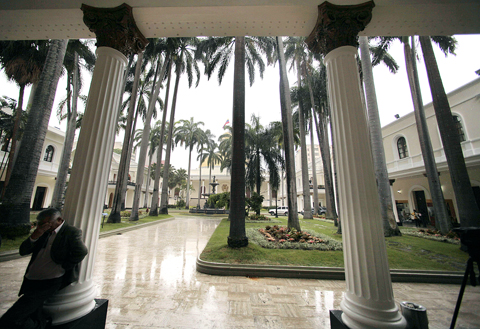Venezuelan lawmakers on Friday approved an election law to redraw voting districts, a step that President Hugo Chavez’s opponents say will give his party a big advantage in next year’s congressional vote.
Ruling party lawmaker Iroshima Bravo downplayed the opposition’s concerns that voting district boundaries could be redrawn to favor the United Socialist Party of Venezuela (PSUV).
“If they have the support of the people, they have nothing to fear,” she said, adding that the legislation was needed because populations had increased or decreased in many municipalities and voting districts should reflect these changes.

PHOTO: AP
The bill easily passed the National Assembly, which is dominated by Chavez allies.
The law authorizes the National Election Council to redraw the boundaries ahead of the election. Four of the council’s five members are widely perceived as pro-Chavez.
Tomas Sanchez, one of a dozen lawmakers who voted against the measure, said he expected the body to “change the district lines, mixing up places where the opposition is stronger with places where the PSUV usually wins, and thereby weaken the opposition.”
The law also changes Venezuela’s proportional representation system in a way that will likely hurt smaller parties.
Under the existing system, 60 percent of lawmakers are elected in single-seat districts, while the remaining 40 percent are elected from a list of candidates chosen by the party.
Currently, if 10 lawmakers are to be elected in a state and one party receives 60 percent of the vote, another 30 percent and a third party 10 percent, then the party that received 60 percent would have six lawmakers elected to the assembly, the runner-up would have three and the minority party would have one.
Under the complex new regulations, seats that previously would have been assigned to minority parties will now be handed over to the top finishers — leaving smaller political groups with little or no representation.
Critics say the law will hurt the coalition of small opposition parties that would challenge Chavez in next year’s congressional polls.
Chavez foes expect to make a strong showing after the opposition made significant gains in November’s gubernatorial and mayoral elections, winning key posts in Caracas and Maracaibo, the country’s second-largest city.
The Venezuelan elections watchdog group Sumate called the law unconstitutional, saying it violates the proportional-representation system outlined in the charter.
“Sumate reminds legislators that they represent the country — not a political tendency,” the group said in a statement.

THE ‘MONSTER’: The Philippines on Saturday sent a vessel to confront a 12,000-tonne Chinese ship that had entered its exclusive economic zone The Philippines yesterday said it deployed a coast guard ship to challenge Chinese patrol boats attempting to “alter the existing status quo” of the disputed South China Sea. Philippine Coast Guard spokesman Commodore Jay Tarriela said Chinese patrol ships had this year come as close as 60 nautical miles (111km) west of the main Philippine island of Luzon. “Their goal is to normalize such deployments, and if these actions go unnoticed and unchallenged, it will enable them to alter the existing status quo,” he said in a statement. He later told reporters that Manila had deployed a coast guard ship to the area

RISING TENSIONS: The nations’ three leaders discussed China’s ‘dangerous and unlawful behavior in the South China Sea,’ and agreed on the importance of continued coordination Japan, the Philippines and the US vowed to further deepen cooperation under a trilateral arrangement in the face of rising tensions in Asia’s waters, the three nations said following a call among their leaders. Japanese Prime Minister Shigeru Ishiba, Philippine President Ferdinand Marcos Jr and outgoing US President Joe Biden met via videoconference on Monday morning. Marcos’ communications office said the leaders “agreed to enhance and deepen economic, maritime and technology cooperation.” The call followed a first-of-its-kind summit meeting of Marcos, Biden and then-Japanese prime minister Fumio Kishida in Washington in April last year that led to a vow to uphold international

US president-elect Donald Trump is not typically known for his calm or reserve, but in a craftsman’s workshop in rural China he sits in divine contemplation. Cross-legged with his eyes half-closed in a pose evoking the Buddha, this porcelain version of the divisive US leader-in-waiting is the work of designer and sculptor Hong Jinshi (洪金世). The Zen-like figures — which Hong sells for between 999 and 20,000 yuan (US$136 to US$2,728) depending on their size — first went viral in 2021 on the e-commerce platform Taobao, attracting national headlines. Ahead of the real-estate magnate’s inauguration for a second term on Monday next week,

‘PLAINLY ERRONEOUS’: The justice department appealed a Trump-appointed judge’s blocking of the release of a report into election interference by the incoming president US Special Counsel Jack Smith, who led the federal cases against US president-elect Donald Trump on charges of trying to overturn his 2020 election defeat and mishandling of classified documents, has resigned after submitting his investigative report on Trump, an expected move that came amid legal wrangling over how much of that document can be made public in the days ahead. The US Department of Justice disclosed Smith’s departure in a footnote of a court filing on Saturday, saying he had resigned one day earlier. The resignation, 10 days before Trump is inaugurated, follows the conclusion of two unsuccessful criminal prosecutions